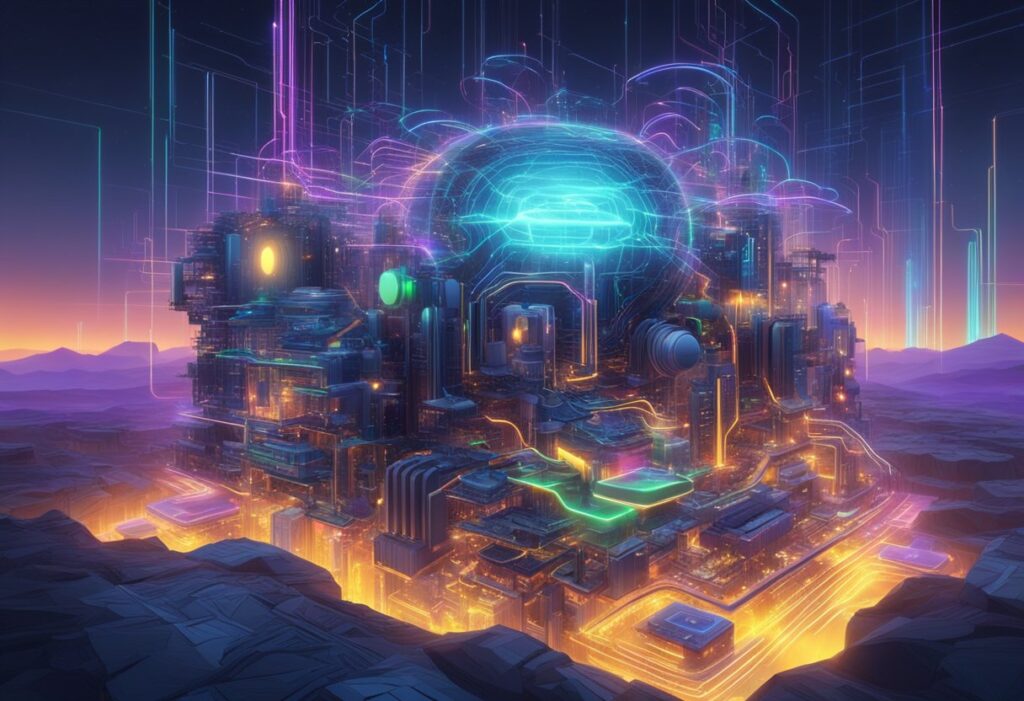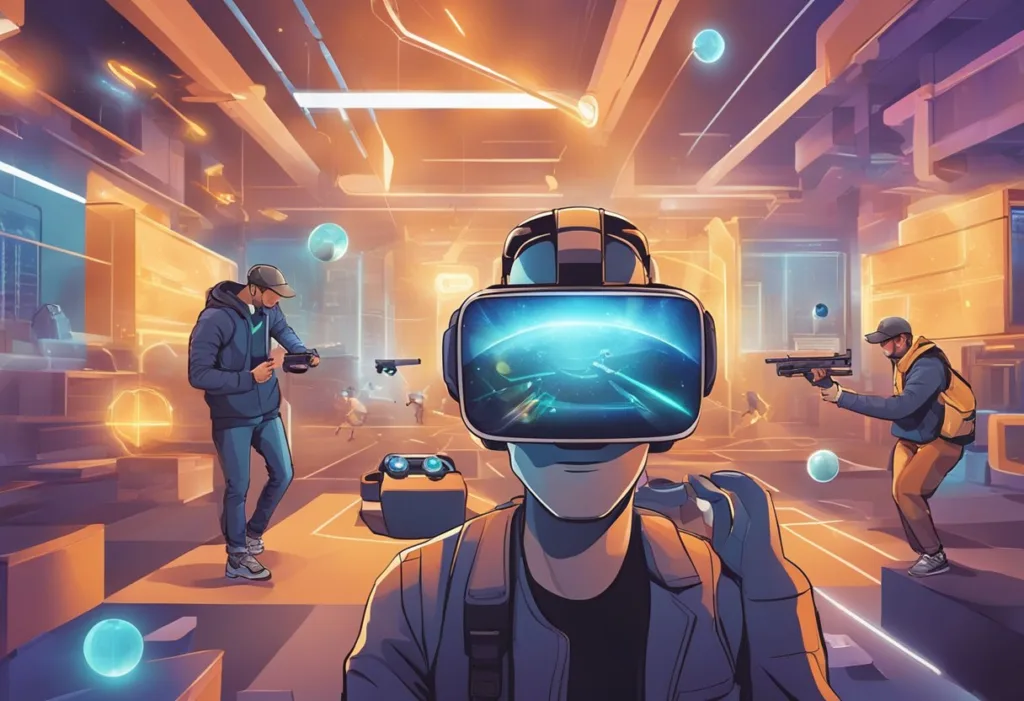The concept of a metaverse engine is gaining traction in the tech world as virtual reality (VR) and web3 technologies continue to evolve. A metaverse engine is essentially a game engine that is designed to create immersive, interactive experiences in a virtual world. It allows developers to create 3D environments and experiences that can be accessed by anyone with an internet connection.
Two of the most popular game engines used for creating metaverse experiences are Unity and Unreal Engine. Both engines offer a wide range of tools and features that make it easy for developers to create immersive experiences. Unity is particularly popular among indie developers, while Unreal Engine is often used by larger studios due to its advanced graphics capabilities.
The rise of web3 technologies has also had a significant impact on the development of metaverse engines. Web3 is a decentralized version of the internet that uses blockchain technology to create transparent, secure, and trustless systems. This technology has the potential to revolutionize the way we interact with the internet, and it is already being used to create decentralized marketplaces, social networks, and other types of applications.
Understanding the Metaverse Engine

The Concept of Metaverse Engine
Metaverse engine is a software platform that enables the creation and operation of virtual worlds, metaverse applications, and immersive experiences. It provides a powerful set of tools and capabilities for developers, content creators, and businesses to build, deploy, and manage metaverse applications and experiences.
History and Evolution
The concept of metaverse engine has evolved over the years, from early virtual reality and gaming engines to modern metaverse platforms. Key players in this space include Unity, Unreal Engine, and Roblox, among others. Tech giants such as Facebook, Microsoft, Apple, and Google are also investing heavily in metaverse technology.
Key Players and Platforms
The metaverse engine landscape is highly competitive, with a wide range of players and platforms. Some of the key players include Unity, Unreal Engine, Roblox, and Decentraland. These platforms offer a range of features and capabilities for building and deploying metaverse applications and experiences.
Technological Aspects
Metaverse engines rely on a range of technologies, including virtual reality, blockchain, generative AI, and spatial computing. They also require robust server infrastructure, high-performance client devices, and advanced libraries and APIs.
Metaverse Engine Features
Metaverse engines offer a range of features and capabilities, including avatar creation, building tools, multiplayer support, voice and spatial audio, and interoperability with other metaverse platforms.
Challenges and Limitations
Metaverse engines face a range of challenges and limitations, including issues with performance, privacy, and interoperability. They also require significant investment in infrastructure and content creation.
Future Prospects
The metaverse engine market is expected to grow significantly in the coming years, driven by increasing demand for immersive experiences and digital ownership. Key growth drivers include advances in blockchain technology, generative AI, and web3.
The Role of AI in Metaverse Engines
Generative AI is a key technology for metaverse engines, enabling the creation of realistic environments, objects, and characters. It also enables advanced features such as spatial computing and holograms.
Metaverse Engine and Web3
Metaverse engines are closely tied to web3, the next generation of the web that is based on blockchain technology. Web3 enables digital ownership, decentralized governance, and new business models for metaverse applications and experiences.
Metaverse Engine and Gaming
Metaverse engines have significant applications in gaming, enabling immersive and social multiplayer experiences. Key games in this space include Minecraft, Fortnite, and Ready Player One.
Metaverse Engine and Social Interaction
Metaverse engines enable new forms of social interaction, including chat, voice, and spatial audio. They also enable new forms of entertainment and social media.
Metaverse Engine and Business
Metaverse engines offer significant opportunities for businesses, including brand marketing, e-commerce, and training and education. They also enable new business models based on digital ownership and non-fungible tokens (NFTs).
Metaverse Engine and Education
Metaverse engines have significant applications in education and training, enabling immersive and interactive learning experiences. They also enable new forms of collaboration and knowledge sharing.
Metaverse Engine and Cryptocurrency
Metaverse engines are closely tied to cryptocurrency and blockchain technology, enabling new forms of digital ownership and governance. They also enable new business models based on NFTs and other blockchain-based assets.
Metaverse Engine and Digital Ownership
Metaverse engines enable new forms of digital ownership, enabling users to own and trade virtual assets and experiences. They also enable new forms of governance and decentralized decision-making.
Metaverse Engine and Smartphones
Metaverse engines are increasingly being developed for smartphones, enabling immersive experiences on mobile devices. Key technologies in this space include XR, spatial computing, and high-performance mobile processors.
Metaverse Engine and Software
Metaverse engines rely on a range of software technologies, including game engines, server software, and client software. They also require advanced libraries and APIs for building and deploying metaverse applications and experiences.
Metaverse Engine and Content Creation
Metaverse engines rely heavily on content creation, including 3D modeling, animation, and scripting. Key tools in this space include Blender, Unity, and Unreal Engine.
Metaverse Engine and Digital Assets
Metaverse engines enable the creation and trading of digital assets, including virtual real estate, virtual goods, and NFTs. They also enable new forms of digital art and creativity.
Frequently Asked Questions
What is the metaverse and how does an engine fit into it?
The metaverse is a shared virtual space where users can interact with each other and with digital objects in a simulated environment. A metaverse engine is a software platform that enables developers to create and manage these virtual spaces. The engine provides the tools and infrastructure necessary to build and host a metaverse, including support for user authentication, content creation, and real-time communication.
What are the top engines for building a metaverse?
There are several metaverse engines available in the market, each with its own set of features and capabilities. Some of the most popular engines include Unity, Unreal Engine, and Decentraland. These engines are widely used by developers to create immersive virtual experiences and environments.
How does MetaGravity’s engine differ from others in the market?
MetaGravity’s engine is a blockchain-based platform that enables the creation of decentralized metaverse applications. Unlike other engines, MetaGravity’s engine provides a secure and transparent environment for users to interact with each other and with digital assets. The engine uses blockchain technology to ensure that all transactions are recorded on a public ledger, providing a high level of security and transparency.
What XR devices are compatible with metaverse engines?
Metaverse engines are designed to work with a variety of XR devices, including virtual reality headsets, augmented reality glasses, and mixed reality headsets. These devices provide users with an immersive and interactive experience, allowing them to explore virtual environments and interact with digital objects in real-time.
What is the role of a metaverse engine in creating a virtual mall platform?
A metaverse engine plays a critical role in the creation of a virtual mall platform. The engine provides the infrastructure necessary to host the platform, including support for user authentication, content creation, and real-time communication. The engine also enables developers to create virtual storefronts, product listings, and payment gateways, allowing users to browse and purchase products in a virtual environment.
How has the funding landscape for metaverse engines evolved in recent years?
In recent years, the funding landscape for metaverse engines has evolved significantly. With the growing interest in virtual reality and blockchain technology, investors are increasingly looking to invest in metaverse engines and related technologies. As a result, many metaverse engine startups have raised significant amounts of funding to develop their platforms and expand their user base.















